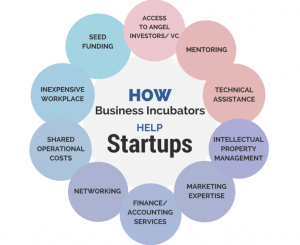In this blog post, Neha Tandon, a student of Svkm’s Pravin Gandhi College of Law, Mumbai and pursuing a Diploma in Entrepreneurship Administration and Business Laws from NUJS, Kolkata, analyses Incubators and the clauses to be added while joining Incubators.
What Is An Incubator?
An incubator is a company that helps startup companies to develop. They provide startups with services like management training and office space to develop. The primary focus of a business incubator is speeding the growth and success of startup companies.
Advantages Of An Incubator
The benefits of an incubator are:
- An incubator provides assistance in setting up a corporate legal structure.
- In an incubator-startup relationship, people exchange ideas and discuss the pros and cons of the business set up.

- As entrepreneurs run incubators, they can be very supportive mentors for a startup due to their knowledge and experience in the field.
- One of the biggest advantages of being a part of an incubator is that one can make a strong business network.
- Business incubators can introduce entrepreneurs to bankers, lawyers and venture capitalists who can be very helpful when it comes to financial and legal aspects of their business.
- Business incubators can provide entrepreneurs with office space and provide them with administrative and other support services.
- Some business incubators also have their own capital to invest in startup ventures.
- People who work at incubators are often described as team players. If an entrepreneur is an introvert and has difficulty in communicating with others and public speaking, then an incubator will help him improve in these areas tremendously.
- The atmosphere at an incubator is encouraging as it is a host to several similar encouragement groups along with success stories.
Disadvantages Of An Incubator
The disadvantages of an incubator are:
- Some incubators place strict requirements on the Founder concerning their location for some period of time.
- Working with an incubator includes high pressure. If one does not have a habit of working in high pressure and dealing with criticism working with an incubator can be a problem.

- Incubators tend to favor the younger people more than older people. One of the reasons for the same is because they are more affluent and they possibly already have an extensive network around them, and they are likely to be interested in starting up companies that require longer runway or capital.
- If an outsider is investing money along with your money there comes, a responsibility on the incubator and not everyone has the ability to manage funds.
- Incubators will be shareholders in your company this means that they will take 2-10% of the stock of the companies.
- Working with a third-party is not easy. Therefore, working with an incubator will take the time that you could spend working on your project.
What Clauses Should You Check While Joining An Incubator?
Not all incubators are the same it is therefore very important to do your research well on what the incubator is likely to offer? What are your own requirements? What is the kind of investment that is involved while joining an incubator? And most importantly, whether the whole package is meeting the needs of your company or not. It is important to look at the fact that does the incubator have experienced mentors that will be beneficial for your startup. The location of an incubator should be such that it suits your requirement as it will make it easier to work together.
Consulting an alumni who have already worked with an incubator is always beneficial. Therefore, one must rate their experience with the incubator so that one gets a better idea while making a choice.
Incubators that have invested in startups as expected they should be informed about the significant activities that have been executed by the startup. These activities will include financing, acquisition offers, and periodic financial reports of the company’s performance. Incubators may require the startup to obtain written consent from them before entering into critical transactions for example selling the company, issuing securities to employees.
Incubators would include anti-dilution right and thus by this kind of right the shares which have been issued to them cannot be diluted until the priced financing is obtained where the company issues preferred stock.
Preemptive rights are the rights which allow incubators to purchase their proportional share in future funding. This means that if they own 5% of the company at the time of signing the agreement they can take 5% of the company’s future financings as long as they are willing to pay whatever is set in that round. Along with anti-dilution rights and preemptive rights, the incubators with strong investor component will include some additional form of investment rights so that they may be capable of purchasing an additional fixed amount of securities at a later date while they also insure that they maintain their ownership percentage. Marketing terms should be clear for the purpose of the public image of a startup. Incubators which have diverse expert panels are likely to have the terms inclined to their interests.
Along with all the above rights confidentiality rights are also Included which means a mutual responsibility and an obligation to keep the information exchanged between both the parties confidential. The startup must ensure that the terms of confidentiality are understood well by them, as many times it is the idea on which the startup work once they enter an incubator.
Conclusion
The concept of incubators is quite interesting, and the chances of success of a startup are high as incubators have entrepreneurs who are very well experienced. Incubators provide startups with financial, marketing, legal services and along with that there is an advantage of expanding business network which is very important for the success of a company. In a startup-incubator relationship, the terms and conditions should be specified at the beginning which will be beneficial for both the startup and the incubator and further it will avoid any misunderstanding.
If startups take the criticism of incubators in a positive sense, the startup-incubator relationship can be very successful.
[divider]
BIBLIOGRAPHY
http://www.fastcompany.com/3027636/4-major-benefits-of-startup-incubators
https://www.allbusiness.com/startup-benefit-business-incubator-19567-1.html
https://www.entrepreneur.com/article/235980
http://blog.ipleaders.in/clauses-check-joining-incubator/
 Serato DJ Crack 2025Serato DJ PRO Crack
Serato DJ Crack 2025Serato DJ PRO Crack










 Allow notifications
Allow notifications


